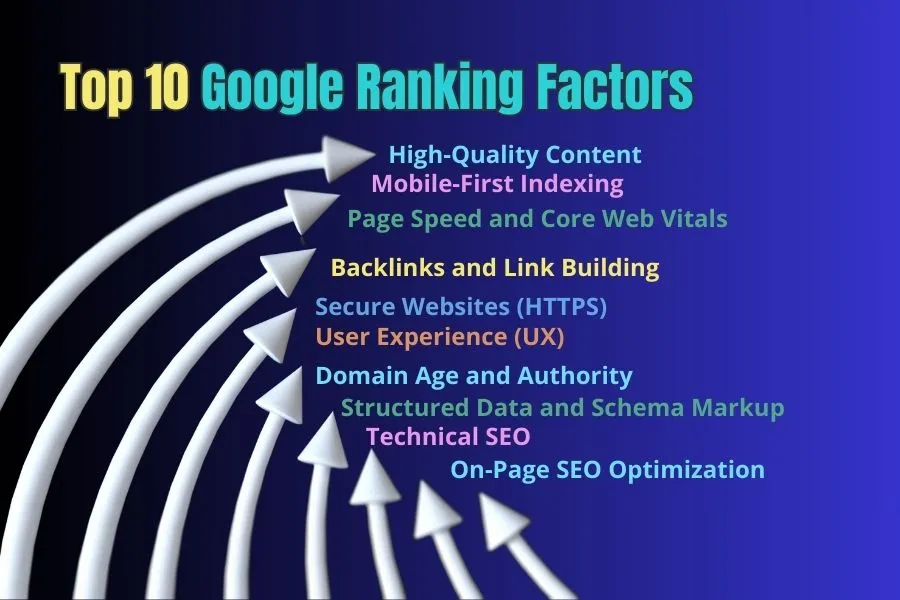Table of Contents
In 2024, Google continues to evolve its ranking algorithms to provide users with the most relevant, high-quality content. As a website owner or digital marketer, understanding Google ranking factors is crucial if you want to drive traffic to your site and stay competitive. In this blog, we’ll dive into the Top 10 Google ranking factors list, how they work, and the free Google ranking checker tool.
Why Google Ranking Factors Matter in 2024
Google processes billions of searches daily, and competition for those top spots on the first page is fierce. Ranking high on Google not only brings in more traffic but also builds credibility for your brand.
Understanding Google’s Algorithm: How It Works

Google’s algorithm uses a combination of over 200 ranking factors to determine the relevance and authority of a website. Each factor is weighted differently, and while some remain constant, others evolve as user behavior and technology change.
How Google Ranks Websites
Google bots, or “crawlers,” scan websites and evaluate them based on key factors like content, relevance, and technical health. Based on the information gathered, Google then decides where your site appears on the search engine results pages (SERPs).
Machine Learning and AI in Google’s Algorithm
Google has increasingly implemented machine learning and AI to better understand user intent. This means the search engine can offer more personalized and accurate results than ever before, which also alters how your website is ranked.
Top 10 Google Ranking Factors list
In 2024, some factors weigh more heavily in the ranking algorithm than others. Let’s break down the top 10 most important Google ranking factors you need to focus on.
1. High-Quality Content
Content is still king. Google’s primary focus is delivering the most relevant and informative content to its users. Make sure your content is original, informative, and updated regularly.
Example: A comprehensive guide on “How to Build a Computer” with detailed steps, illustrations, and troubleshooting tips.
Relevant URL: https://www.wired.com/story/how-to-build-a-pc/
2. Mobile-First Indexing
Google primarily checks the mobile-friendliness of your site for indexing and ranking. If your site isn’t optimized for mobile, you’re missing out.
Example: A news website with a responsive design that adapts seamlessly to different screen sizes.
Relevant URL: https://www.cnn.com/
3. Page Speed and Core Web Vitals
Core Web Vitals—metrics that focus on user experience such as loading speed and interactivity, are crucial for ranking. Google has made it clear that user experience is paramount.
Example: An e-commerce website that loads quickly and has minimal page load time.
Relevant URL: https://www.amazon.com/
4. Backlinks and Link Building
Quality backlinks from authoritative websites continue to be one of the most important ranking factors. Focus on creating valuable content that earns you those natural backlinks.
Example: A guest post on a reputable blog linking back to your website.
Relevant URL: https://moz.com/blog
5. Secure Websites (HTTPS)
Having an HTTPS-secured website is a must. Not only does it make your site secure, but Google also ranks HTTPS sites higher than non-secure ones.
Example: A website with a padlock icon in the address bar, indicating HTTPS security.
Relevant URL: https://www.google.com/
6. User Experience (UX)
A good user experience—easy navigation, clean design, and quick load times—will keep visitors on your site longer, signaling to Google that your site is valuable.
Example: A website with a clean and intuitive interface, easy navigation, and fast load times.
Relevant URL: https://www.apple.com/
7. Domain Age and Authority
Older domains generally rank better because they have established trust over time. However, building authority through consistent, quality content can level the playing field for newer domains.
Example: A well-established website like Wikipedia or The New York Times.
Relevant URL: https://www.wikipedia.org/
8. Structured Data and Schema Markup
Structured data helps Google better understand your content, improving how it’s displayed in search results. Adding schema markup can give your site a visibility boost.
Example: A recipe website using schema markup to display rich snippets in search results.
Relevant URL: https://www.allrecipes.com/
9. Technical SEO (Sitemaps, Crawlability, etc.)
Ensure that your site’s technical aspects, such as XML sitemaps, are optimized. A site that is easy for Google to crawl and index will perform better.
Example: A website with an XML sitemap and optimized robots.txt file.
Relevant URL: https://search.google.com/search-console/about
10. On-Page SEO Optimization (Keywords, Tags)
On-page elements like meta tags, headers, and keyword placement are still vital to SEO success. Make sure you’re using your focus keyword and relevant LSI keywords effectively.
Example: A blog post with relevant keywords in the title, headings, and content.
Relevant URL: https://www.semrush.com/blog/seo-blog/
How to Improve Your Google Ranking in 2024
If you want to climb the ranks in 2024, here are some practical steps to get started.
1. Conducting a Site Audit
A thorough audit will help you find any SEO issues with your site. This includes checking page load speed, mobile responsiveness, and fixing broken links.
Google Search Console: This free tool from Google provides insights into your site’s performance, including crawl errors, mobile-friendliness, and site speed.
Google PageSpeed Insights: This tool analyzes your site’s speed and provides recommendations for improvement.
Broken Link Checker: This online tool can help you identify broken links on your website.
2. Improving Content for User Intent
Create content that is helpful for the audience. Conduct keyword research, but also ensure that your content answers user questions comprehensively.
Examples:
Keyword research: Use different of tools including free and paid like Google Keyword Planner, SEMrush, or Ahrefs to search relevant keywords.
User-centered content: Create content that answers user questions and provides value.
Long-form content: In-depth, comprehensive articles can rank well in search engines.
3. Using a Free Google Ranking Checker Tool
To monitor your progress, use a free Google ranking checker tool. This allows you to see how your website ranks for specific keywords and identify areas for improvement.
Examples:
Google Search Console: As mentioned earlier, Google Search Console can also be used to track your site’s rankings.
Rank Tracker: This free tool allows you to track your rankings for specific keywords.
SERP Checker: Another free tool that provides keyword ranking data.
Tools and Resources to Improve Google Ranking

Here are some tools you can use to enhance your site’s SEO.
Best Free and Paid Tools
Google Search Console: This tool shows analytics of visitors and provides insights you’re your how your site performs in google results.
Ahrefs: A powerful paid tool for backlink analysis, keyword research, and competitor analysis.
- URL: https://ahrefs.com/
SEMrush: A comprehensive SEO and marketing toolkit that offers features like keyword research, competitor analysis, and backlink auditing.
Moz: A suite of SEO tools, including Moz Pro for in-depth analysis and Moz Local for local SEO.
- URL: https://moz.com/
Why Regular Monitoring is Important
SEO is an ongoing process. Regularly checking your site’s performance allows you to:
- Identify issues: Discover technical problems, slow load times, or outdated content that may be affecting your rankings.
- Track progress: Monitor your keyword rankings, organic traffic, and other key metrics over time.
- Make data-driven decisions: Use insights from your analytics to optimize your content, improve your website structure, and build better backlinks.
Conclusion
Ranking high on Google in 2024 is about more than just keywords. You need to focus on multiple factors, from mobile optimization to high-quality content and user experience. By paying attention to these key ranking factors and staying up to date with emerging trends, you can improve your site’s visibility and drive more traffic.
FAQs
1. What are the Top Google ranking factors in 2024?
The most important factors include high-quality content, mobile-first indexing, page speed, backlinks, and user experience.
2. How does Google rank websites?
Google ranks websites based on over 200 factors, including relevance, authority, and technical SEO elements.
3. Why is mobile-first indexing important?
Google uses the mobile version of your site for indexing, making mobile optimization crucial for ranking.
4. What is a free Google ranking checker tool?
It’s a tool that allows you to monitor your website’s position in Google search results for specific keywords.
5. How can I update my SEO strategy?
SEO is a continuous process. Regularly check the analytics of your site and make changes accordingly.

